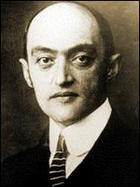
Joseph Alois Schumpeter (Moravia, present Czech Republic, 1883 - Connecticut, USA, 1950) is, along with Keynes and Hayek, one of the most outstanding economists of the twentieth century. Born in the ancient Austro-Hungarian Empire, he studied Law and Social Sciences at the University of Vienna, where he was a student of Menger and Böhm-Bawerk. He practiced law in Cairo temporarily and, after World War I, he was Minister of Economy of the Austrian Social-Democratic Government and director of the Biedermann Bank. In the 1930s he settled permanently in the United States, where he dedicated the rest of his life to teaching at Harvard University. Initially linked to the Austrian School of Economics, he ended up distancing himself from the conservative branch of the same represented by Hayek and Mises. His work stands out for the study of economic cycles and the role played in these by the innovation and by the figure of the entrepreneur. Among his most outstanding essays are Theory of Economic Development (1912), Economic Cycles (1939), Capitalism, Socialism and Democracy (1942), a work that brought him international fame, and History of Economic Analysis (1954), published posthumously.





